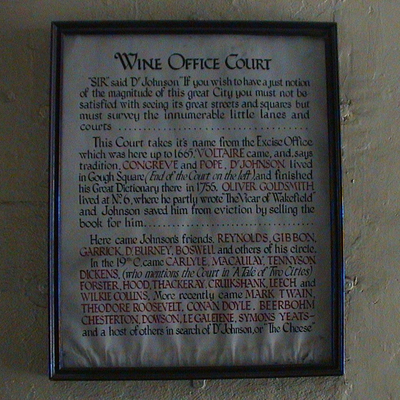Poet. Born Lombard Street. A childhood illness left him only 4 and a half feet tall, hunchbacked, crippled and with chronic pain. Best known for his satirical poems. Also a wit: "And all who told it added something new, and all who heard it, made enlargements too." "An honest man's the noblest work of God." Died at his home in Cross Deep, Twickenham (where Pope's Grotto can still be seen). Buried next to his parents in Twickenham church.
This section lists the memorials where the subject on this page is commemorated:
Alexander Pope
Commemorated ati
Alexander Pope
In a house in this Court Alexander Pope, poet, was born, 1688. The Corporatio...
Alexander Pope - W4
Alexander Pope, 1688 - 1744, poet, lived in this row, Mawson's Buildings, 171...
Mawson Arms and Fox and Hounds
The Mawson Arms The Fox and Hounds Brewing on this site can be traced back ov...
Wine Office Court
The Rhymers' Club is not specifically mentioned on the plaque but Ye Olde Che...
Other Subjects
Oliver Goldsmith
Author. Born Co. Longford, Ireland (though it could have been County Roscommon, and for his date of birth we have only his word). Arrived in London in 1760 and joined the literary group that inclu...
John Dryden
Poet and playwright. Born in Aldwincle, Northamptonshire. The first Poet Laureate. Died in London. Initially buried in St Anne's Church, Soho but quickly reburied in Chaucer's grave in Westminster ...
Wilfrid Scawen Blunt
Diplomat, poet, hedonist and traveller. Born Petworth House, Sussex. Advocated anti-Imperialism, and supported Irish nationalism. Legendary womaniser, one being William Morris's wife, Jane. Married...
Tom Moore
Iris poet, singer and songwriter. Born Thomas Moore at 12 Aungier Street, Dublin. He came to London to study law at the Middle Temple and befriended many prominent people. In 1803, he was appointed...
Person, Music / songs, Poetry, Caribbean Islands, Ireland, USA
Dante Alighieri
Italian poet, writer, and philosopher. Unusually for the time he wrote in Italian rather than Latin. His Divine Comedy is widely considered one of the most important poems of the Middle Ages and th...
Previously viewed
Trollope & Colls Ltd
Construction firm. Formed in 1903 from the merger of George Trollope & Sons, and Colls & Sons. Acquired by Trafalgar House in 1969.
Charles Dickens
Born, son of Elizabeth and John Dickens, at No.1 Mile End Terrace, Landport, Portsmouth (where there is a museum). For a map showing many of his London addresses see Londonist. His family were so p...













Comments are provided by Facebook, please ensure you are signed in here to see them